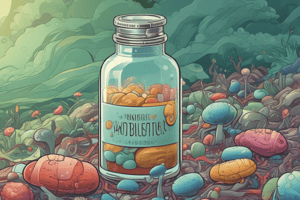Podcast
Questions and Answers
Who discovered penicillin by accident in 1928?
Who discovered penicillin by accident in 1928?
- Louis Pasteur
- Alexander Fleming (correct)
- Jonas Salk
- Edward Jenner
What is the consequence of misusing antibiotics?
What is the consequence of misusing antibiotics?
- Development of new antibiotics
- Creation of superbugs (correct)
- Cure for viral infections
- Increase in human lifespan
What is the main reason bacteria can evolve quickly in response to antibiotic exposure?
What is the main reason bacteria can evolve quickly in response to antibiotic exposure?
- They reproduce much faster than humans (correct)
- They can adapt to any environment
- They have a strong immune system
- They have a large genome
What is the Mega-Plate used for?
What is the Mega-Plate used for?
Why is it essential to use antibiotics wisely?
Why is it essential to use antibiotics wisely?
Who warned about the dangers of overusing antibiotics?
Who warned about the dangers of overusing antibiotics?
What percentage of the Sun's UV radiation is absorbed by the ozone layer?
What percentage of the Sun's UV radiation is absorbed by the ozone layer?
What were CFCs initially developed for in the 1920s?
What were CFCs initially developed for in the 1920s?
What happens to CFCs in the stratosphere?
What happens to CFCs in the stratosphere?
How many ozone molecules can a single chlorine atom destroy?
How many ozone molecules can a single chlorine atom destroy?
Who demonstrated the harmful effects of CFCs on the ozone layer in the 1970s?
Who demonstrated the harmful effects of CFCs on the ozone layer in the 1970s?
What was the clear indication of ozone depletion by 1985?
What was the clear indication of ozone depletion by 1985?
What was the consequence of inaction on ozone depletion?
What was the consequence of inaction on ozone depletion?
Who led the international effort to ban CFCs?
Who led the international effort to ban CFCs?
What was the role of NASA visualizations and satellite data in the ozone depletion crisis?
What was the role of NASA visualizations and satellite data in the ozone depletion crisis?
Why were CFCs widely used in various products?
Why were CFCs widely used in various products?
Flashcards are hidden until you start studying
Study Notes
- Antibiotics revolutionized medicine in 1928 when Alexander Fleming discovered penicillin by accident.
- Penicillin saved millions of lives by fighting infections from various sources like war, surgery, and everyday cuts.
- The misuse of antibiotics leads to the development of superbugs - bacteria that are resistant to antibiotics.
- Scientists have created a giant petri dish called The Mega-Plate to observe the rapid evolution of E.coli developing resistance to antibiotics.
- Bacteria reproduce much faster than humans, allowing them to evolve quickly in response to antibiotic exposure.
- Overuse of antibiotics in humans and animals drives the evolution of resistant bacteria on a global scale.
- Alexander Fleming himself warned about the dangers of overusing antibiotics and the moral responsibility that comes with it.
- It is crucial to use antibiotics wisely, only for bacterial infections, to avoid exacerbating the issue of antibiotic resistance.
The Ozone Layer Problem
- The ozone layer absorbs about 98% of the Sun's UV radiation, protecting plant and animal DNA.
- A rapidly expanding hole in the ozone layer was discovered in the 1980s, threatening life on Earth.
CFCs and Ozone Depletion
- Chlorofluorocarbons (CFCs) were developed in the 1920s as coolants for refrigerators and later used in various products.
- CFCs were non-flammable, non-toxic, and made great propellants, foaming agents, and fire-retardants.
- In the stratosphere, CFCs are broken apart by UV light, releasing chlorine atoms that destroy ozone molecules.
- A single chlorine atom can destroy thousands of ozone molecules before forming a stable molecule.
The Discovery and Response
- Chemists Mario Molina and Sherwood Rowland demonstrated the harmful effects of CFCs on the ozone layer in the 1970s.
- By 1985, the rapid ozone depletion over Antarctica was clear, and chemical tests confirmed CFCs as the cause.
- NASA visualizations and satellite data revealed the extent of the ozone layer losses.
The Consequences and Solution
- If ozone depletion continued, rates of skin cancer would increase, and global agricultural production would plummet.
- The Montreal Protocol, signed in 1987, required the phasing out of CFCs and created a fund to assist developing countries.
- US President Ronald Reagan and UK Prime Minister Margaret Thatcher led the international effort to ban CFCs.
The Legacy and Remaining Challenges
- The Montreal Protocol serves as a model for global cooperation in combating climate change.
- Hydrofluorocarbons (HFCs), alternatives to CFCs, are also potent greenhouse gases and contribute to climate change.
- The Kigali Amendment, added to the Montreal Protocol in 2016, aims to reduce global HFCs by 85% by 2047.
- The Montreal Protocol's success highlights the need for decisive global cooperation to combat climate change.
Studying That Suits You
Use AI to generate personalized quizzes and flashcards to suit your learning preferences.




